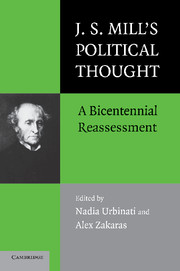Book contents
- Frontmatter
- Contents
- List of Contributors
- Introduction
- PART ONE LIBERTY AND ITS LIMITS
- PART TWO DEMOCRACY AND THE INDIVIDUAL
- PART THREE BEYOND NATIONAL BORDERS
- 11 Cosmopolitan Patriotism in J. S. Mill's Political Thought and Activism
- 12 Mill and the Imperial Predicament
- 13 Making Sense of Liberal Imperialism
- 14 Mill's “A Few Words on Non-Intervention”: A Commentary
- Bibliography
- Index
12 - Mill and the Imperial Predicament
Published online by Cambridge University Press: 08 January 2010
- Frontmatter
- Contents
- List of Contributors
- Introduction
- PART ONE LIBERTY AND ITS LIMITS
- PART TWO DEMOCRACY AND THE INDIVIDUAL
- PART THREE BEYOND NATIONAL BORDERS
- 11 Cosmopolitan Patriotism in J. S. Mill's Political Thought and Activism
- 12 Mill and the Imperial Predicament
- 13 Making Sense of Liberal Imperialism
- 14 Mill's “A Few Words on Non-Intervention”: A Commentary
- Bibliography
- Index
Summary
In the late pamphlet titled “England and Ireland” (1868), J. S. Mill perceptively noted the tenuous grounds underlying even the most confident presumptions of liberal imperialism in nineteenth-century Britain. Written during a period of intense Fenian activity in Britain and Ireland – when popular perceptions of Irish political resistance were less than sympathetic – the pamphlet contained pointed reflections on the root causes of the deteriorating political situation in Ireland as well as Mill's most searching analysis of the fraught dynamics of imperial power and ideology. Of English attitudes towards its civilizing project in Ireland, he wrote,
we, or our ruling classes, thought, that there could be no boon to any country equal to that of imparting these [English] institutions to her, and as none of their benefits were any longer withheld from Ireland, Ireland, it seemed, could have nothing more to desire. What was not too bad for us, must be good enough for Ireland, or if not, Ireland or the nature of things was alone in fault.
(CW VI, 511)In marking the ways in which the project of imperial liberal reform when faced with resistance or disappointment shifted the burden of responsibility for this failure onto colonized societies themselves, Mill's critical portrait exposed a fragility at the heart of the liberal imperial project. In its disavowal, in locating responsibility solely with “Ireland or the nature of things,” liberal imperialism revealed at once the limits to its own discourse of ethical rule and its persistent blindness to these limits.
- Type
- Chapter
- Information
- J.S. Mill's Political ThoughtA Bicentennial Reassessment, pp. 298 - 318Publisher: Cambridge University PressPrint publication year: 2007
- 12
- Cited by



